PhD Students
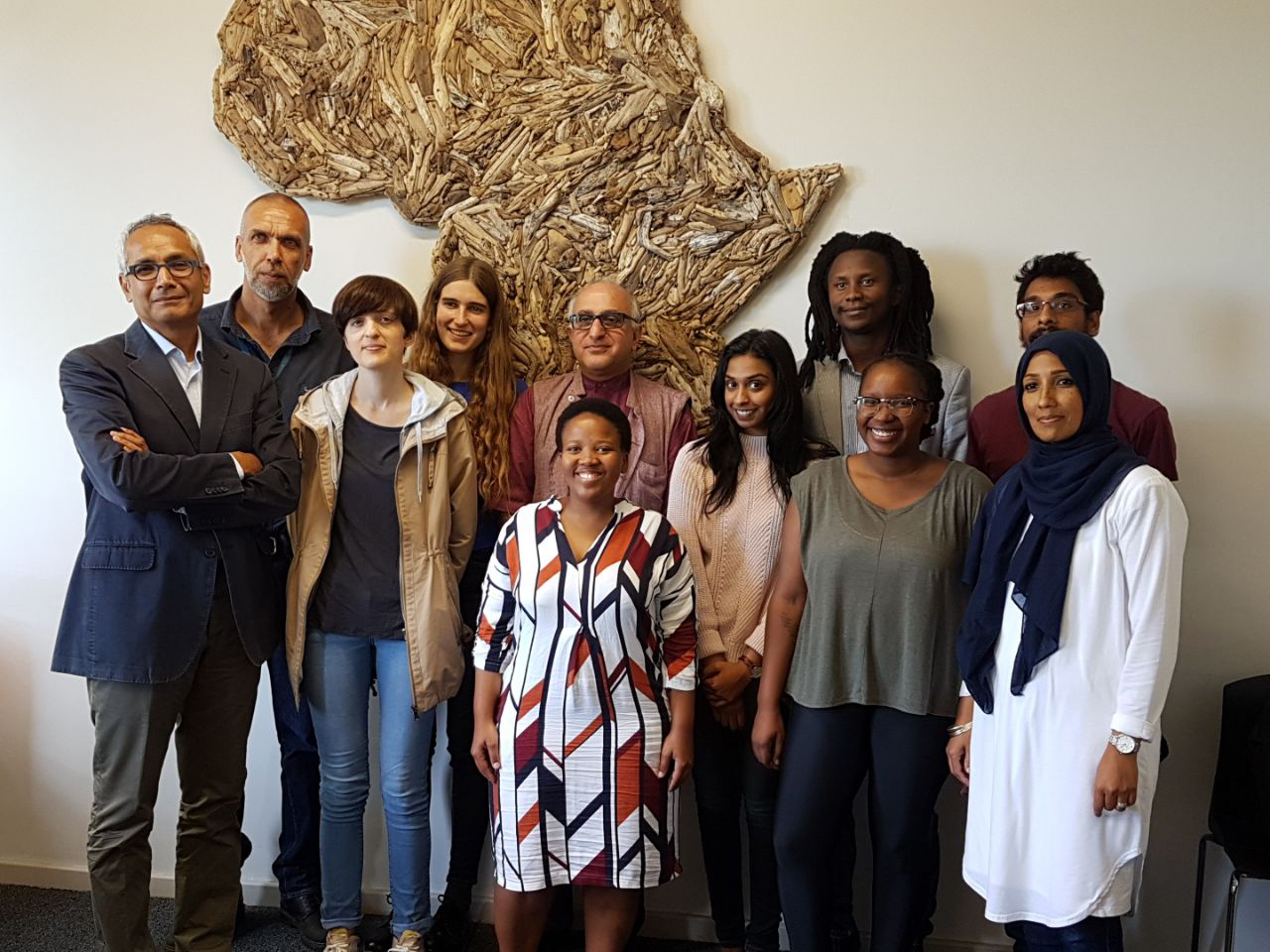
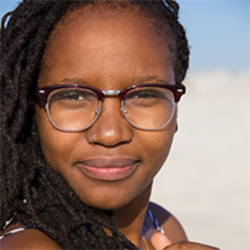
Ayanda Nxusani is a first year Masters student in the Historical Studies Department at the University of Cape Town. Prior to pursuing her Masters, Ms. Nxusani completed her Honours in Justice and Transformation in the Politics Department where her research focused on how the transmission of trauma intergenerationally can help us better understand South Africa’s born free generation. In 2016 she pursued a graduate certificate in Interfaith Dialogue at Hartford Seminary in the United States. Ms. Nxusani’s undergraduate is in Politics, International Relations and Economic History.
Born in one of the biggest townships in South Africa, Ms. Nxusani was raised by her domestic worker mother who ensured that she provided everything necessary to give her daughter a better future. Ms. Nxusani prides herself in coming from a female headed household which is why her Masters research will be focusing on how trauma and traumatic experiences are passed down generationally through the female form in black families. Pursuing a Masters at the University of Cape Town through the help of the History Access Bursary will build towards Ms. Nxusani’s desire to be an academic and write about the immaterial loss that black people experienced under apartheid and colonialisms and how it now affects the identity formation of young black people in South Africa.
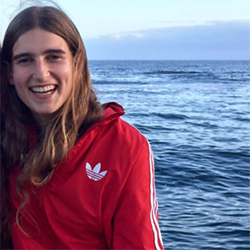
I completed a BA in English and Historical Studies at UCT in 2017. I’m interested in histories of the every day, specifically histories of swimming. I intend to focus my Honours work on tidal pools in Cape Town. I think this research will let me plunge into questions of public space, race, gender, ritual, and histories of the sea more broadly. I’m also interested in presenting historical findings in accessible forms (like podcasts) so that discussions about the every day can become part of the every day more easily.
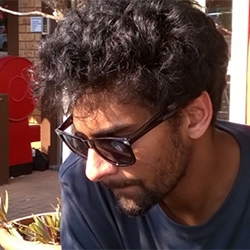
My university studies began at what is currently Rhodes university, where I completed my Bachelor of Arts in Politics and English literature. I then went on to complete my Honours in Politics. Some years later, after some disillusionment with the academy, I registered for a Post-Graduate Certificate in Education at UCT, which led to an interest in teaching, and especially History curriculum revision. I am a qualified high school History and English teacher.
From this, I was lucky enough to be absorbed into the Archives & Public Culture initiative (APC), where I had the opportunity to work between the UCT History Department and School of Education, reading for a Masters in Arts. My MA thesis focused on the public production of Mapungubwe as an historical event, and, more generally, the production of the problematic concept of the ‘precolonial’. The work spans between various disciplines, including archaeology, education and curriculum theory, the broad expanse of History as a discipline, and critical literary studies.
During this time, I have had the opportunity of contributing to various APC workshops, the Precolonial Catalytic Conference (held at Nelson Mandela University), and a focus group on ‘Public Discourses on the Past Before Colonial Times’ (coordinated by the Nelson Mandela Foundation and the Harvard University Centre for African Studies).
My PhD work will hopefully engage further with History methodologies, particularly under present political and disciplinary conditions – at universities and beyond. Since the idea of the ‘precolonial’, and how we conceive and engage with such histories has become increasingly more publicly contested, it would be very interesting to consider a larger breadth of instances of the politicisation of histories of times before coloniality.
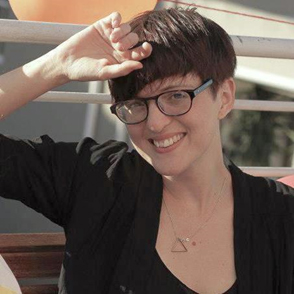
Having just completed my undergraduate degree at the University of Cape Town, it is an incredible privilege to now be undertaking my History Honours here as well. I look forward to the year with great excitement and gratitude at being selected for the History Access Programme.
My research interests lie at the intersections of memory, time, place, and language – with specific emphasis on the concepts of ‘home’ and ‘identity’. Specifically, I would be interested in exploring these themes in relation to South African history and a personal experience of a collision of meanings attached to place and time, through memory and language. This involves the recent evocation of my own childhood memories of occupying the spaces of Cradock, my hometown, upon discovering traumatic histories attached to these spaces, and the ensuing shifts that occurred in the process of integrating vastly disparate sets of spatial meaning within my understanding of ‘home’.
Additionally I want to investigate processes of conscious or unconscious ‘knowing’ and ‘unknowing’ that might influence the preservation, fortification, and celebration of some histories but not others within specifically small rural communities in areas thought of as the ‘Cape Frontier’ under colonial rule. In small towns such as Cradock, the circumstances of life and labour remain physically and psychologically intimate, and this might frustrate a larger national theme of ‘bystanders’ ‘not knowing’ about the repressive violence and injustices of apartheid. It bears further questioning whether processes and patterns of ‘knowing’ and ‘unknowing’ during apartheid continue to operate today. I feel there is an opportunity to apply and extend Ann Stoler’s concept of ‘colonial aphasia’, connoting not simply ignorance or absence of knowledge but also “loss of access and active dissociation”, into my investigation.
I furthermore believe the popularisation of history is a crucial endeavour to support. The discipline of history has the capacity to powerfully impact the shaping of social relationships. However, it appears great effort is required to attain the kind of understanding of historic issues that can shift individual perspectives. It therefore seems that more, and new points of entry should be created to make history effortlessly accessible to the public so that important ideas may gain mass popularity. I am particularly interested in exploring the potential of podcasting as a mode of representing history and thus introducing responsible, representative, and critical historiography to the wider public beyond academic institutions.
My journey to a university education in Historical Studies was perhaps a bit longer than most. I previously studied art and ceramics, lived and worked in the United Kingdom for a few years, studied fashion design upon my return home, worked in the film and fashion industry as an entrepreneur and free-lancer, and most recently consulted as a visual merchandising advisor to the design manager for Special Occasions in-store decor at Woolworths. My other interests include film, theatre, and literature. I prefer hiking to swimming, and in my spare time I enjoy tackling DIY and sewing projects.
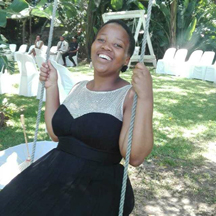
I recently completed my undergraduate degree majoring in Economic History and Social Anthropology. I am excited to be studying towards a History Honours this year. I am eager to see the work that will come out as a result of the History Access Programme and how it will contribute to a new body of work as well as intervening and engage in debates and contending views.
My research interests include looking at the absence of black women’s writing and their contribution to public discourse in South Africa’s literary and political histiography. This is sparked by the writing of Nontsizi Mgqwetho in a multi-lingual newspaper Umteteleli wa Bantu and Noni Jabavu’s work in the Daily Dispatch. Nontsizi Mgqwetho’s ability to articulate what it means to be black in an urban space; she was writing at a time when there were many criticisms of the leaders of the ANC and there were conflicts in the mines.
I am also interested in the complexities of being black and modern and how this manifested after the establishment of the Union of South Africa and the Land Act of 1913, the ability of African intellectuals to assert their humanity, modernity and agency is something that I have encountered in the writings of many black intellectuals, especially those who studied overseas and came back to South Africa and had to move between these two worlds.
Writing in IsiXhosa has allowed me to express myself in a compelling way and I have been able to speak to a wider audience by doing so. My ability to write, speak and read IsiXhosa has also broadened my understanding of the world and I am richer because of it. I would love to contribute to an intellectual project that is able to examine historical patterns, processes an interconnections in a creative way that is creative and allows for critical research.
Apart from academics, I am passionate about the media space, and I have been able to enhance my skills in radio working as a presenter, newsreader and producer. My other interests include hair, books and music. I am obsessed with the ocean and my favourite pastime is learning IsiXhosa Methodist hymns.
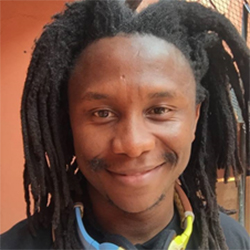
I am from Zwelethemba, Worcester, Western Cape. I am an activist scholar who is deeply interested in questions of humanism through a radical questioning of systems of race, gender and class. My intellectual pursuits have propelled me beyond the strictures of academic disciplines which have often set me at odds with academia.
My current research interests pertain to questions of the centrality of violence in the making of the modern world. Of particular interested is black subject formation and the problem of freedom against colonialism and its afterlives.
I will be looking into black resistance forms in South Africa mostly in the 19th century through the figure of Maqoma as representative of traditional resistance that refused an adverse incorporation into imperialist capitalist society. I read this tradition of Maqoma in contradistinction with the black liberal tradition characterized by the South African Native National Congress (SANNC, later ANC) in the 20th century as representative of modern resistance which prioritized representation and enfranchisement that rebelled and complied with notions of the colonial civilization mission. I wish to pursue themes that connect with colonial epistemic erasures and re-inscriptions by indigenous people in their registers, knowledge production, philosophies of history, meditations on conceptions of freedom and emancipation by the oppressed, the maternal heritages of black radical tradition. I will work in, through and beyond different academic fields such as history, political thought, philosophy, cultural, literary studies etc.
The centrering of Maqoma as a symbolic and gestural figure of articulation is not a mere feature of a case study. Maqoma takes stage as providing experience and the phenomenological, interpretative devices as located in a body of theorization that is essentially rooted in the communities of the oppressed. In this work, Maqoma depicts features of the indigenous native intellectual tradition of amaQaba - a group of natives that rejected and resisted against Euro-modernity as opposed to amaGqobhoka - the Christianized native intellectuals of the SANNC which will I look in contradistinction to each other. I wish to show that in their rejection of Euro-modernity, amaQaba were always already engaged in black performance as a radical critique of Euro-modernity as well as an offering of whole alternatives to the conceptions not only of the human but also of being.
The colonial attack on Maqoma is representative of global attacks on indigenous people in order to set into full motion native people's dependence on the colonial system by decimating their independence which was rooted on land, cattle, indigenous religiosity, etc. Maqoma's anti-colonial praxis of Maqoma is instructive of a suppressed politico-philosophical thought that Maqoma inherits and augments. For a reading and understanding of this archive, indigenous intellectual sources and archives are required. This offers an opportunity to go beyond a critique of the canonical Western knowledge project and its modalities. In this work I set about to do exactly this. Wherever I fail, I will have dared to contribute to the foundation for decolonized scholarship in Africa that affirms our existence.

I am very excited and grateful to currently be studying History as a postgraduate at the University of Cape Town. I completed my Bachelor of Arts (Honours) Degree in History at Rhodes University in 2016.
Although it is now clear to me that historical research is my true interest, my undergraduate degree did include three majors; Anthropology, English Literature and History. These disciplines have all complemented each other throughout my research and they have helped to shape the interests that are most important to me. With these disciplines as my starting point, it is clear why my approach to research has always been multidisciplinary.
Over time, my areas of research have only changed slightly. I am still deeply interested in postcolonial studies in general, as well as the visible shifts that occur throughout historical representation. More recently, however, my research has become for specific within the field of history. ‘Subaltern Studies’ and ‘History from Below’ are both areas of historical research that interest and influence my work.
Even more specifically, I have a keen interest in South African Labour History. It is through this labour perspective that I have developed a deeper interest in South African Corporate History. My honours paper stemmed from this interest and was archive based as it focused on the way that mining companies, like Gold Fields Ltd., chose to represent themselves in a changing South Africa. I am still deeply interested in each of these aspects of historical study. In the time that has passed since I graduated, I have developed a keen interest in similar shifts across the entire South African private sector. I am very keen to continue my research along this trajectory.
I spent 2017 away from my studies and worked as part of the production team at a Durban-based digital media company called Audience Networks. During this time I presented online videos and also worked behind the scenes to edit them and put them together. I learnt a great deal during this period and I have since become even more excited about the social media as a platform of communication, and what this means for the future.
Apart from social media and historical research, my other interests also include literature, film, and travel. I believe that I have been quite lucky to explore each of these hobbies as much I have over the past few years and that they align, for the most part, with my academic interests as well. I am looking forward to my postgraduate studies and I am very excited to be a part of the History Access Project.
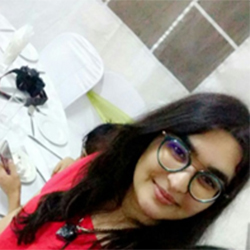
It was with great surprise and excitement that I discovered I was accepted for the History Access Masters' scholarship. Both my undergraduate and honours degree were completed at UCT, with my undergrad majors being English, History and Philosophy. In my third year of study, I took two comic book seminars in English and History respectively, which resulted in a short comic book about the Rhodes Must Fall movement. Through the encouragement of my tutor and other professors in the History Department, I made the comic my Honours dissertation and now I am thrilled to have the opportunity to improve it for my Masters degree.
Comic art is a liminal space that often gets brushed off as fiction for children, and is misunderstood as being simple. In fact, there are layers of understanding in reading a comic book and my hope is to be able to create a textured work that requires many readings to peel back the meaning therein. Although I draw more inspiration from the world of manga and anime than from traditional Western comics, I firmly believe that my book will be something that young and old alike can engage in. The topic of 'Rhodes Must Fall' makes this even more important, for my work engages with meaning-making, memory and how the youth involved in these student protests have come to understand their pasts and intend to (re)make and (re)imagine their futures, and the future of South Africa. I am incredibly grateful to have been given this opportunity by the History Access programme.
Outside of my project, I am interested in international politics, the sociocultural history of Japan and the history of non-white soccer and cricket in Northern Natal. I have a great deal of interest in the geek scene of Cape Town, and usually attend comic book/gaming conventions as an organising member of Cosplay Cape Town or Otaku Girls CT.